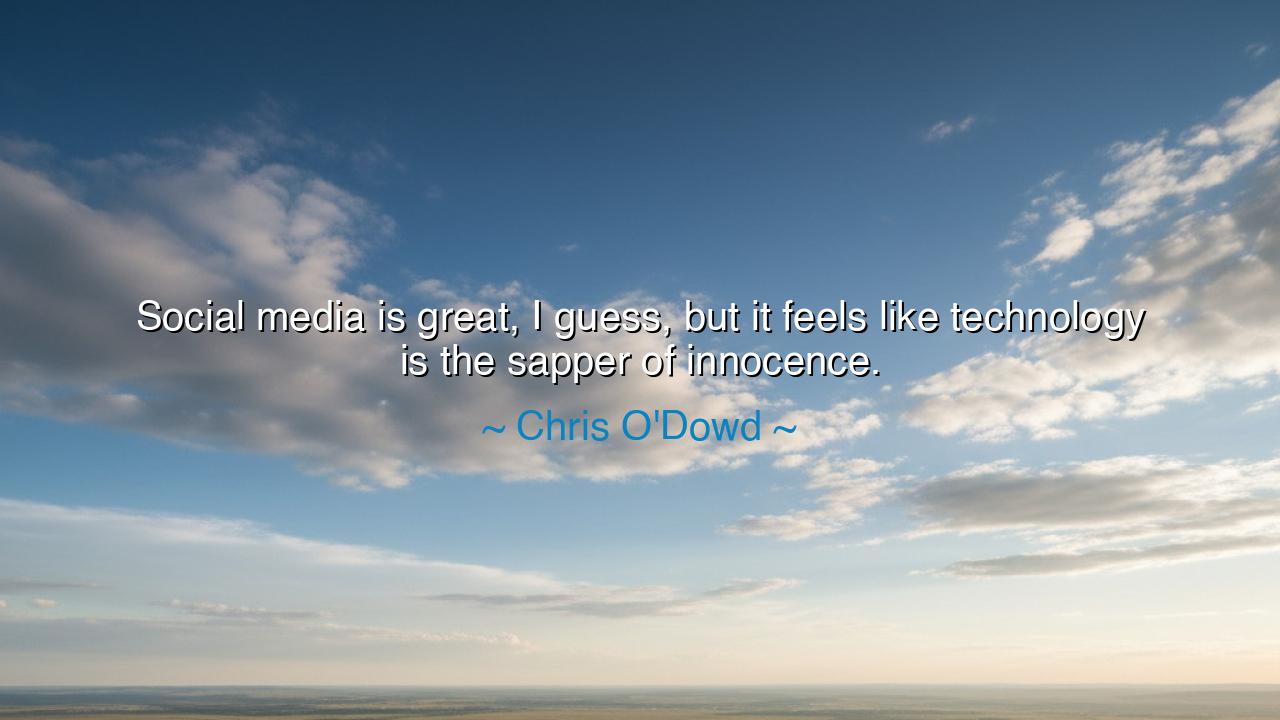
Social media is great, I guess, but it feels like technology is
Social media is great, I guess, but it feels like technology is the sapper of innocence.






Hear, O listener, the words of Chris O’Dowd, who spoke with both wonder and lament: “Social media is great, I guess, but it feels like technology is the sapper of innocence.” In this utterance lies a paradox: the very instruments that connect us, that promise joy and fellowship, also strip from us a purity once treasured. For while social media opens doors to voices across the earth, it also drags into the light the shadows of envy, vanity, and cruelty. And thus, as O’Dowd declares, the sweetness of innocence is often eroded by the relentless tide of technology.
The origin of this wisdom comes from the age in which we live, where children are born not into meadows and open fields, but into screens and glowing lights. Once, youth was shielded by distance and time; the mistakes of the young faded quickly, remembered only in the whispers of a village. Now every misstep, every folly, may be captured, shared, and mocked by countless strangers. This is the price of social media’s power: what gives voice to the voiceless can also steal the gentle veil of innocence that once protected the growing soul.
The ancients, too, knew of such losses, though not with wires and signals. When the printing press first spread its pages, many rejoiced at the democratization of knowledge. Yet others feared that the sacred mysteries once guarded by priests and scholars would now be cheapened, stripped of reverence. In every age, when technology rises, something of the untouched and the innocent is diminished. O’Dowd’s lament is but the modern echo of an old cry: progress often demands the sacrifice of simplicity.
Consider the story of Malala Yousafzai, a young girl whose words of courage spread through digital networks to inspire millions. Yet before her triumph, the same networks that carried her voice also carried threats, hate, and violence. Here lies the dual truth of O’Dowd’s observation: social media is indeed great, for it can magnify courage and truth. But in magnifying all things—good and evil alike—it also hastens the loss of innocence, thrusting the young into storms they are scarcely ready to endure.
Thus the meaning of O’Dowd’s words is clear: technology is not merely a tool, but a force that reshapes the very soul of society. It brings us power, but power often comes at the cost of purity. The laughter of children, once carefree, now carries the shadow of comparison, judgment, and performance for an unseen audience. The innocence that once lingered in ignorance is now consumed by exposure. To live in this age is to walk daily on the edge between connection and corruption.
What lesson, then, must future generations take? It is this: rejoice in the gifts of social media, but guard your soul against its hunger. Do not measure your worth by the eyes of strangers; do not surrender your joy to the endless comparisons it fosters. Protect the sacred flame of innocence, for once it is lost, it is hard to restore. And if you see others falter in this battle, offer patience and compassion, for all are struggling under the same unseen weight.
Therefore, let your actions be thus: set boundaries in your use of technology. Seek time apart from the screen, where silence and stillness can restore the soul. Remember that the truest friendships are not counted in likes or shares, but in presence, trust, and sacrifice. Teach the young to tread carefully, to value their hearts more than their images. And above all, remember O’Dowd’s warning: while social media may be great, it will always tempt you to trade innocence for attention. Do not let it rob you of what is purest within.






AAdministratorAdministrator
Welcome, honored guests. Please leave a comment, we will respond soon